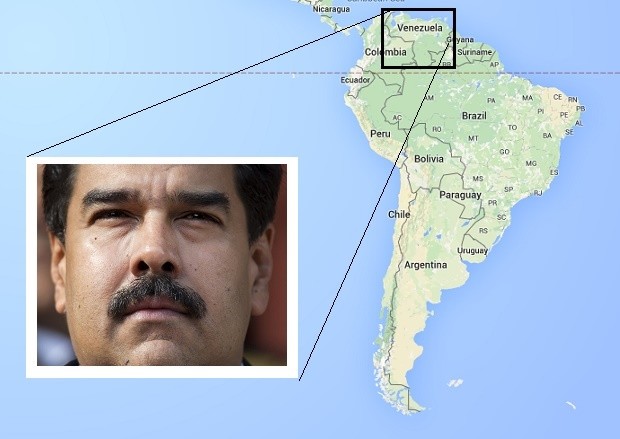Venezuela teeters on chaos as leader orders state of emergency

Economically challenged Venezuela teeters on the verge of chaos as President Nicolas Maduro (inset) enforces a state of emergency amid food and power shortages. AP / GOOGLE MAP
CARACAS, Venezuela — Venezuela was seen teetering on the verge of chaos Sunday after President Nicolas Maduro ordered a state of emergency allowing the seizure of paralyzed factories and military exercises to counter alleged plans for an “armed intervention.”
The United States believes the oil-rich South American nation may be sliding toward popular revolt amid food and power shortages, runaway inflation, protests and political uncertainty, according to senior US intelligence officials.
Maduro on Friday announced the full-blown state of emergency across the country, expanding on a more limited “economic emergency” he had declared in January.
On Saturday he said military exercises would be held next weekend “to prepare ourselves for any scenario.”
The extent of the decree was unclear and was to be published on Monday. Political analysts said it could be used to limit the right to protest, authorize preventive arrests and allow police raids without a warrant.
Maduro said the measures, which initially apply for three months, will likely be extended through 2017.
He said the government would grab factories that had been closed by owners complaining of a lack of raw materials and foreign currency to pay suppliers.
“We must take all measures to recover productive capacity, which is being paralyzed by the bourgeoisie,” he told a rally of his supporters in Caracas.
“Anyone who wants to halt (production) to sabotage the country should get out, and those who do must be handcuffed” and imprisoned, he said.
The announcement could notably affect the Polar group, Venezuela’s biggest food company, which halted production on April 30.
Collapsing economy
Maduro, an ally of late leader Hugo Chavez, has presided over a collapse of Venezuela’s economy since he took charge in 2013.
The global plunge in oil prices, an economy that shrank nearly 6 percent last year, inflation projected to rise to as much as 700 percent this year, lack of food, and a drought that has forced extreme energy rationing have all fueled public anger against the 53-year-old president.
The opposition, which won parliamentary elections last December, has been trying to stage a recall vote to oust Maduro.
But it has been stymied by the electoral commission and supreme court judges, and on Sunday, Vice President Aristobulo Isturiz vowed that “Maduro is not going to exit via referendum.”
Maduro has accused the United States of wanting to rid Latin America of leftwing “progressive currents,” and said Brazil’s suspension of its president, Dilma Rousseff, last Thursday was a sign of that.
While the United States a year ago declared Venezuela a threat to its national security, President Barack Obama’s administration has largely refrained from public comment on the country’s political situation to avoid being seen as meddling.
But last Friday, two US intelligence officials briefing a number of journalists on condition of anonymity suggested that Maduro’s days in power were numbered as Venezuela’s economy tanks.
“You can hear the ice cracking,” The Washington Post newspaper quoted one of the officials as saying. “You know there’s a crisis coming.”
Social ‘explosion’
Venezuela is the third biggest foreign supplier of oil to the United States, behind Canada and Saudi Arabia, providing around nine percent of US oil imports, according to the US Energy Information Administration.
The US is Venezuela’s main oil export market, taking in 40 percent of its production. Its next biggest customers are India and China.
Oil revenues represent 95 percent of Venezuela’s export earnings, according to OPEC.
Venezuela’s opposition has also warned of the risk of a social “explosion” in the country.
It says Maduro’s decree to ensure the supply of basic foodstuffs could result in sweeping expropriation that would destabilize the country and prevent a recall referendum.
The opposition says it has collected 1.8 million signatures backing the referendum. But the vote must be held by the end of the year to trigger new elections. Any later, and, if the recall succeeds, Maduro’s vice president would take over.














